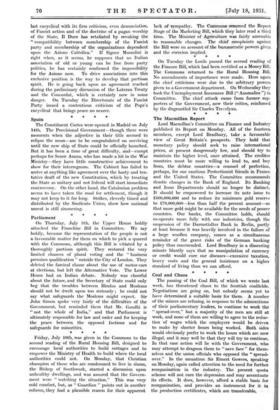The Macmillan Report Lord Macmillan's Committee on Finance and Industry
published its Report on Monday. All of the fourteen members, except Lord Bradbury, take a favourable view of Great Britain's prospects. They hold that monetary policy should seek to raise international prices, at present dangerously low, and should try to maintain the higher level, once attained. The creditor countries must be more willing to lend to, and buy from, the debtor countries—a counsel of perfection, perhaps, for our cautious Protectionist friends in France and the United .States. The Committee recommends drastic changes in the Bank of England. Its Banking and Issue Departments should no longer be distinct. It should be empowered to increase its note issue to £400,000,000 and to reduce its minimum gold reserve to £70,000,000—less than half the present amount—so that more gold might be available for the needs of poorer countries. Our banks, the Committee holds, should co-operate more fully with our industries, though the suspension of the Darmstidter Bank in Berlin, partly at least because it was heavily involved in the failure_ of a large woollen company, comes as a simultaneous reminder of the grave risks of the German banking policy thus commended. Lord Bradbury in a dissenting minute bluntly says that no manipulation of currency or credit would cure our diseases—excessive taxation, heavy costs and the general insistence on a higher standard of living than we can afford.
* *


































 Previous page
Previous page